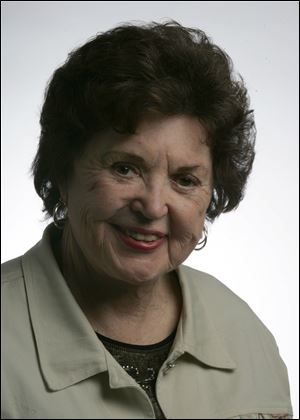
Easter finery, flowers have changed a lot over the years
4/20/2014
Mary Alice Powell.
Obviously members of the 1946 class of Adrian High School enjoy the food at the Country House near Tecumseh, Mich., because we have gathered there for lunch once a month for several years. But, what we really enjoy is the conversation after lunch and last Monday was no exception.
Our subjects are a hit and miss agenda. We don’t believe in a set program but prefer instead to just lean back in our chairs and over one more cup of coffee discuss everything from classmates who have died, to nutrition, music, fashion, and politics.
We covered most of them last week, but our big discussion this time was Easter and how some customs have changed.
It was when the chocolate foil-wrapped eggs were passed that the Easter conversation sparked. We may talk about past, present, and future weight-loss programs, but I noticed the large candies were more popular than the small ones.
Only one person declined because, she said, chocolate contains caffeine that can disrupt sleep.
Our Easter Sunday memories are a review of women wearing colorful spring hats and corsages that emitted floral fragrances throughout the church. It was a time when dress showed an appropriate respect for church, in contrast to today’s “come to church as you are” attire.
Corsage and hat traditions, it seems, are all but forgotten.
Phyllis Campbell of Toledo, a class member, saves her navy blue 50-year-old Jackie Kennedy-style pillbox to wear to teahouses, including the Swan House in Findlay and Governor Croswell’s in Adrian. Louise Phipps, of Onsted, Mich., also admits to saving a favorite hat. It’s a black felt cloche with a veil that she gets out once a year to wear.
I also have hats I can’t part with, but Easter corsages are a treasured personal memory.
In my junior and senior high school years I worked at Storrs Flower Shop in downtown Adrian. I made funeral sprays and cemetery wreaths, but designing corsages was my favorite assignment. We had many orders for corsages for school proms, but the Easter orders outnumbered them to a degree that I worked all night turning out the corsages that were picked up by customers on their way to church in the morning.
I remember a wonderful sense of accomplishment walking home on Easter morning after all the corsages were made and delivered, and carrying the largest one for my mother to wear when we went to church together.
I agree that pinning on a corsage just right to miss the skin and still make it secure on the shoulder was always a challenge.
Which side to pin it on was also in question and there was also the chance of the pin tearing your dress. Still, their demise leaves a big hole in the Easter parade.
Diane Fritz, manager of Barrett’s Flower Shop in Adrian, planned to make only one corsage this Easter.
“It will be for my mother. After all, she has to have a corsage,” she said.
Ms. Fritz described Easter as a big plant day instead of the one-time tradition of corsages.
“People just don’t dress up anymore for church to wear a corsage,” she said. “Now they may even wear blue jeans and T-shirts. I remember as a child putting on my white gloves and new white shoes for Easter Sunday.”
Richard Fortner, a salesman at Glendale Flowers in Toledo, also said that plants are now preferred more than are corsages at Easter. In his 15 years at the store he has also noted the popularity of hydrangeas over the traditional Easter lilies.
Both Mr. Fortner and Ms. Fritz said that wrist corsages, or floral bracelets that are often designed with sparkles, have replaced prom corsages. The wrist designs often incorporate reusable bracelets.
In the 68 years since 46ers were graduated from high school and went out into the big world, we feel that we have contributed much to society. With the exception of the hardships of World War II, we are pleased with the era in which we have lived and the many changes, both good and bad.
We feel we have earned the right to be opinionated on things like rap music, scantily dressed girls in public, and young people who talk so fast we can’t understand them.
But, all in all life is still good. Louise said it all when she said, “I’m too busy to think about my age.”
And, Gerry Tucker spoke for the whole class when she added, “And, don’t you think we still are looking good?”
Mary Alice Powell is a retired Blade food editor.
Contact her at: mpowell@theblade.com